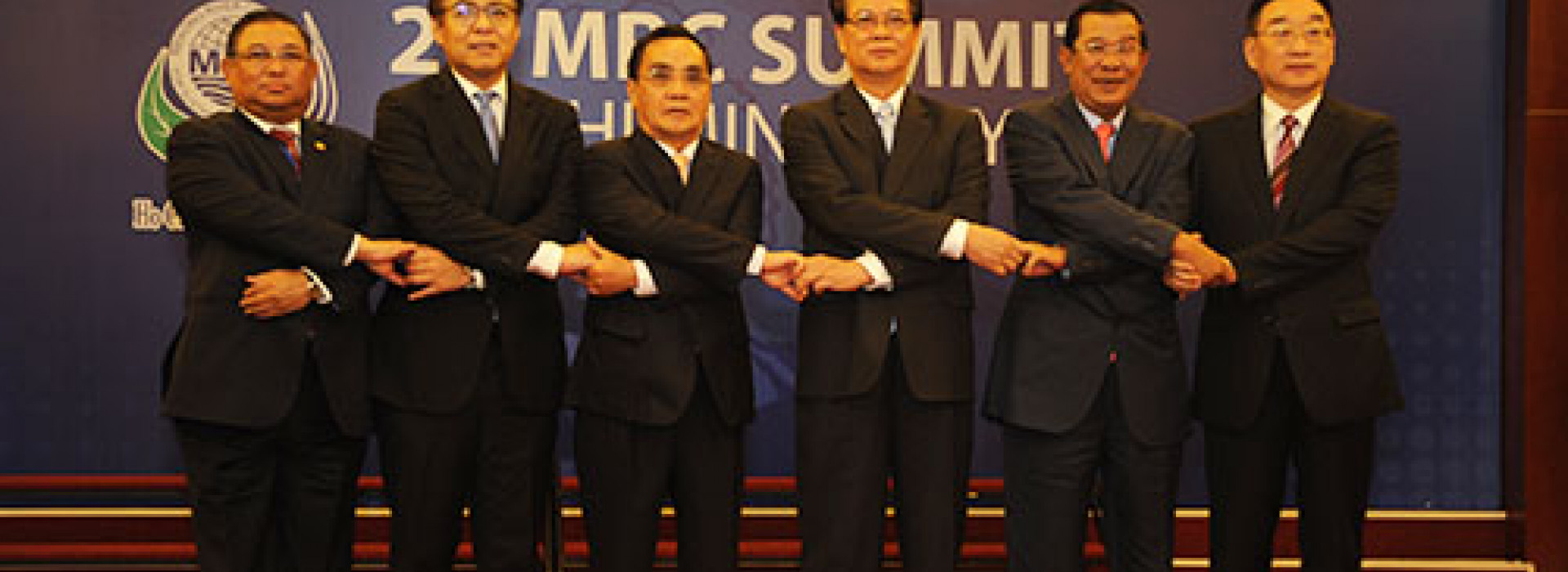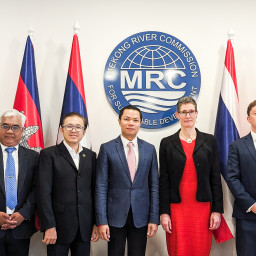Mekong leaders seek sound judgment on development risks
Accelerating basin-wide studies to reduce negative impacts and battling natural disaster woes are among key priorities for Mekong nations
HO CHI MINH CITY, Viet Nam, 5th April 2014—Heads of government of Cambodia, Lao PDR, Thailand and Viet Nam today reaffirmed their commitment to the Mekong cooperation, to follow up the implementation of the Hua Hin Declaration of 2010, and set priorities for the Mekong River Commission, including the need to expedite studies and research for sound advice and recommendations on development that will increasingly place burdens on Mekong resources.
The Ho Chi Minh City Declaration was adopted by The Prime Minister of the Socialist Republic of Viet Nam, H.E. Mr. Nguyen Tan Dung; The Prime Minister of the Kingdom of Cambodia, Samdech Akka Moha Sena Padei Techo Hun Sen; The Prime Minister of Lao PDR, H.E. Mr. Thongsing Thammavong; and the Special Envoy of The Kingdom of Thailand, H.E. Mr. Sihasak Phuangketkeow.
Among its conclusions, the leaders stated that The MRC Council Study and the Mekong Delta Study will provide a basis for better understanding about potential risks and benefits of development initiatives.
At the end of the Second MRC Summit, the national leaders also set other priorities for the Mekong River Commission to take action to address regional opportunities and challenges over the next decade including population growth, increasing demand for water, food and energy and climate change.
The Council Study on Sustainable Management and Development of the Mekong River, including the impacts of mainstream hydropower projects has been initiated by the MRC Council which comprises water and environment ministers at their annual Meeting in December 2011. The Council Study aims to provide a better picture on potential transboundary impacts due to mainstream developments.
“To address such challenges, national efforts are not enough. We need to strengthen regional cooperation, particularly among the riparian countries, both upper and lower, through multilateral and sub-regional mechanisms such as the MRC,” said Vietnamese Prime Minister Nguyen Tan Dung, whose country hosted the Second MRC Summit.
“We note that the development of water resources of the Mekong River Basin has contributed largely to the socio-economic development of the region, such as for navigation, energy and food production, but also has negative environmental and social impacts in the Basin that need to be fully and effectively addressed,” the leaders said in the Ho Chi Minh City Declaration they adopted at the Second MRC Summit.
The MRC will focus on avoiding, reducing and mitigating risks to river ecology, food security, livelihoods and water quality posed by intensive agriculture, aquaculture and irrigation as well as hydropower, navigation and other development activities, the Declaration says.
The document acknowledges the progress made since the 1st Summit in Hua Hin in 2010 and reiterates the need for the Member Countries to work through the mechanisms of the MRC to manage the shared waters.
“The MRC should be measured in how it fosters international cooperation and in the end how the outcomes of the cooperation is producing improvements in society, the environment and economic development,” said Hans Guttman, Chief Executive Officer of the Mekong River Commission Secretariat.
The leaders also prioritised further efforts to reduce the risks of floods and droughts and the effects of sea level rise in the Mekong Basin.
In battling the effects of natural disaster, leaders stressed that the Mekong Countries recognise that climate change will continue to alter the hydrological regime of the basin and consequently effect livelihoods and economies in the region.
The MRC will look ahead and set a clear direction, identifying new opportunities and addressing challenges to come up with the next strategic plan and to engage more meaningfully not only with development partners but also all other stakeholders, especially civil society.
The heads of government reaffirmed their political commitment to implement the 1995 Mekong Agreement and commit to enhance and strengthen the MRC’s relationships and cooperation with Dialogue Partners, China and Myanmar and Development Partners.
Languages
Note to editors:
The Second Summit gathers Prime Ministers of MRC Member Countries, Cambodia, Lao PDR, Thailand and Viet Nam and delegations from China and Myanmar along with other regional leaders, water experts and diplomats to address the most pressing issues on the Mekong River and its resources and set strategic directions and policy for the MRC.
Summary of the Ho Chi Minh Declaration
Water, Energy and Food security in the context of climate change for the Mekong River Basin
April 5 2014
The Heads of the MRC Governments reaffirm the importance of the sustainable use and management of the water and related resources of the Mekong River Basin, and their political commitment to implement the 1995 Mekong Agreement, and also recognise the achievements made since the last Summit. The Declaration highlights the following issues:
- Regional opportunities and challenges over the next decade including population growth, increasing demand for water, food and energy and climate change. This will place burdens on the Mekong resources. New cooperation opportunities with other regional and international initiatives will be explored to face these challenges.
- Priority areas of action including the implementation of the MRC’s Council Study on Sustainable Management and Development of the Mekong River Basin, including the impacts of mainstream hydropower projects, and the Mekong Delta Study initiated by Viet Nam; furthering efforts in disaster risk reduction of floods and droughts; measures to maintain good water quality and avoid, reduce and mitigate risks to river ecology, food security and livelihoods; improving the implementation of the MRC Procedures; expanding cooperation with Dialogue and Development Partners.
- Moving ahead by committing to strengthen the role of the MRC in integrated water resources management and supporting the decentralisation process aimed at self-financing by 2030; prioritising capacity building for the Member Countries.
The Heads of Government agree to task the MRC Council to ensure the effective implementation of the Declaration through practical programmes and projects. The Third MRC Summit will take place in 2018 in Cambodia.
The MRC is the intergovernmental body responsible for cooperation on the sustainable management of the Mekong Basin whose members include Cambodia, Lao PDR, Thailand and Viet Nam. It is established to promote cooperation amongst the Member Countries and thus it is not a supra-national or regulatory body.
-END-





